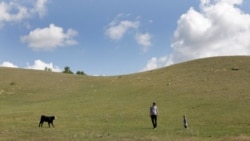Farmers who raise cattle are losing money in areas from western Canada to the states of northern Mexico.
They are having trouble finding enough food for their animals because of very dry conditions known as drought.
Some farmers are buying feed for their animals from other parts of North America, but it is too costly for others.
Dianne Riding raises cattle in Lake Francis, Manitoba. She is a rancher. She told the Reuters news agency that she recently had to sell 51 of her cattle, about 40 percent of the herd.
Some of the cattle were young females who were supposed to give birth to many babies in the future. She said selling the young cows was “gut-wrenching,” or sad.
She may get money now for selling the cattle, but her earnings will not be as high in years to come.
“That’s your future,” she said about the young cows.
Other ranchers and cattle experts said if people like Riding keep selling their animals, the supply of beef will go down and the cost of meat in North America will go up.
The drought is affecting areas throughout western North America. Fields where cows eat grass are dry. Fruit is not growing well in Washington. And California is suffering its worst wildfire season.
Climate scientists say global warming will make droughts happen more often. But some farmers think the current drought is part of a cycle that will end sometime soon. Even Riding, who had to sell her cows, thinks the drought will soon ease.
Gloria Montano Green works for the U.S. Department of Agriculture. She said there is a clear link between the drought and climate change.
“We’re seeing climate change,” she said.
With dry fields, some farmers in western Canada brought in food for their cattle from Prince Edward Island, which is over 3,000 kilometers to the east.
Brian Perillat works for CanFax, a company that follows the market for cattle in Canada. He said in a normal year, ranchers cull about 10 percent of their older animals. But because of the drought, they will probably cull two or three times more than that. His company has no record of such big reductions in herds in one year going back to 1970.
Cattle live throughout the U.S. so not all herds are affected. But research from U.S. Drought Monitor shows that ranchers in some areas are going to reduce the size of their herds by more than usual this year.
Pat Boone raises cattle in New Mexico. He said he reduced his herd by about half this year.
“Our land is hurt, and it’s hurt badly,” he said. It will take time for him to buy and raise more cattle. “We’re not going to be in any hurry,” he added.
Mike von Massow studies agricultural economics in Ontario. He said reducing the number of cows today affects the supply of cattle for many years. “You have this hangover,” he said.
Riding, the rancher in Manitoba, said even if the weather gets better soon and the fields turn green again, it will take several years for young cows to start having babies.
And if the ranchers have trouble, people in the U.S. will pay more for beef.
Von Massow said in Canada, after a 2014 drought, meat prices rose by 25 percent and stayed high for another two years.
Fernando Cadena is head of Mexican ranching company Carnes Ribe, based in the Mexican state of Chihuahua.
He said farmers must wait for the fields to get healthy again.
“For months, it just didn’t rain,” he said.
Greg Schmidt is chair of a group of businesses in Alberta, Canada, that feed cows right before they are killed for food. He said all parts of the cattle business will have problems.
“This is going to ripple through our industry for years,” Schmidt said.
Steve Arnold is a rancher in California. His land is about 300 kilometers northwest of Los Angeles. He said there has been less rain than usual for 12 of the last 15 years. But this year is the worst.
"We've had dry stuff but not like this," he said.
I’m Dan Friedell.
Rod Nickel and Tom Polansek wrote this story for Reuters. Dan Friedell adapted it for Learning English. Mario Ritter, Jr. was the editor.
Do you think the farmers will be able to recover from the drought? Tell us in the Comments Section and visit our Facebook page.
__________________________________________________
Words in This Story
cattle –n. large farm animals raised for milk and meat
rancher –n. a person who lives and works on a large farm for raising animals
herd –n. a group of large animals that live and are kept together
beef –n. the meat of cattle
cycle –n. a set of events that happen again and again over time
hangover –n. the unpleasant effects of something that happened at an earlier time; a sick feeling that comes after drinking too much alcohol at an earlier time
ripple –v. something like a wave that spreads out over time






